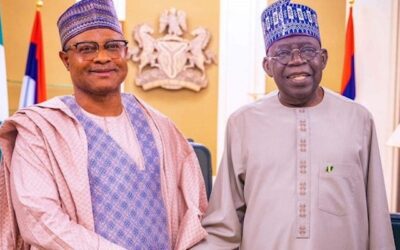Osun State Invests In Gold Mining – A Call For Exploration Of Nigeria’s Natural Resources
Nigeria is a country immensely blessed with various natural resources, some of which have been and are being explored; while others have not yet been explored. However, the potential benefits of those resources to the nations and citizenry are far from realized for the benefit of the larger part of the population. With the major concentration on the oil industry, the other natural resources available to the nation are not utilized. President of Miners’ Empowerment Association of Nigeria, Mr. Sunny Ekosin said that the country loses about 50 trillion Naira annually from her untapped resources. From untapped gold alone, an estimate of 8 trillion naira was discovered to have been lost annually in Nigeria.
In Northern Nigeria, Plateau State has about 22, Nasarawa, 21; Kaduna, 19; Sokoto,12 ; Bauchi, 11; Benue, 10; Kogi, 9; Borno, 8; Kano, 7; Abuja, 7; Katsina, 3; Zamfara, 2, with Adamawa, 4; Kwara, 8; Gombe, 2; Yobe, 2; Niger, 3; while Jigawa, Kebbi, and Taraba states have one mineral deposit. In Western Nigeria, Ondo, 12 Edo, 11; Oyo, 11; Lagos, 3; Ekiti, 5; Osun, 6; Ogun, has 7 mineral resources. In Eastern Nigeria, Enugu, 3; Ebonyi, 3; Abia, 6; Imo, 8; Anambra, 9 unexplored assets and in Southern Nigeria, Rivers, 6; Akwa Ibom, 7; Cross River, 8; Delta, 8; Bayelsa, 8 untapped mines.
In the 2019 NEITI’s report titled ‘Improving Transparency and Governance for Value Optimization in Nigeria’s Mining Sector,’ NEITI identified low perception index, weak regulatory architecture, and the absence of mining majors as the bane of the sector. A section of the report reads:
Read Also: Zamfara Establishes Gold Reserve
‘However, despite Nigeria’s extensive and globally competitive regulatory framework, Nigeria’s mining industry is largely unexploited and contributes very little to the country’s industrial output. As at 2016, the Mining Index for Nigeria was still comparatively the lowest at 84.1 percent, in comparison with that of the USA at 133.9 percent, Australia at 131 percent or even South Africa at 98 percent. This is expected, since these are known destinations with long-tested mining cultures, and consistency in the form. This implies that the growth opportunities that await Nigeria in the mining sector cannot be over emphasized.’
Recently, the Nigerian Association of Chambers of Commerce, Industry, Mines, and Agriculture (NACCIMA) and the sector’s stakeholders, stated that the volume of Nigeria’s iron ore alone can generate over $60 billion on a yearly basis if well managed. For decades, the mantra of ‘economic diversification’ characterized attempts to reverse Nigeria’s dependence on oil with little real progress. Despite numerous reforms, international loans and restructuring programs, 85 million Nigerians live in deteriorating conditions of poverty. The current Corona virus pandemic combined with mounting debt obligations and declining GDP gives new urgency to this issue. The global economy is already undergoing tectonic structural changes that will affect demand for Nigeria’s oil, leaving a fossil fuel-dependent economy more vulnerable.
However, progress is in sight as the construction of Nigeria’s only large-scale commercial gold mine has begun in Osun State and the facility will start producing gold in 2021. According to the Federal Ministry of Mines and Steel Development, the facility demonstrates the Federal Government’s desire to make the mining sector the mainstay of the country’s economy. The Segilola Gold Project is a high-grade gold project being developed in Osun, Nigeria. Thor Explorations is a company developing the project in partnership with the state government. This is set to be the first large-scale mining project in the country. Preliminary Feasibility Study (PFS) for the gold project was completed in September 2017, while the Definitive Feasibility Study (DFS) and the Preliminary Economic Assessment (PEA) study were completed in February 2019. Production is expected to average at 80,000oz through its initial mine life of five years.
The Segilola Gold Project is located approximately 120km from the capital city of Lagos and hosted within the ML41 mining license. The project area is hosted in the crystalline basement complex rocks of Southwestern Nigeria and forms a part of the Upper Proterozoic rocks of the Ilesha schist belt. The Company’s flagship project which comprises a proposed open pit gold mining project based on an indicated mineral resource defined by a comprehensive drilling program over 16,000 metres of RC and Diamond Drilling to define a high-grade resource and probable reserve:
NORINCO International Cooperation (NORINCO) was awarded the engineering, procurement, and construction contract for the processing plant and the associated infrastructure. Consultants involved in the preparation of the DFS were Roscoe Postle Associates, GR Engineering Services, NORINCO, Auralia Mining Consulting, and Knight Piesold Consulting. Roscoe Postle also drafted the PEA for the proposed underground project.
The State of Osun received a sum of N100 million from Badger Mines, a Canada-based mining company, as sign-on fee for exploration and development of one of the state’s mining titles. The Osun State Governor, Gboyega Oyetola, disclosed this while delivering his address at the opening ceremony of the three-day Economic and Investment Summit held at Aurora Event Centre in Osogbo. The governor noted that the government had earlier executed a Memorandum of Understanding (MoU) with the mining company as part of necessary preparation for the commencement of mining operations in the state. It is important to note that the State acquired 17 mining licenses for Gold – 10; Quarry – 4; Lead/Zinc – 2; and Quartz and Feldspar -1, from the Nigeria Mining Corporation.
The gold mine would provide over 1,000 direct and indirect jobs for Nigerians, provide an additional stream of non-oil revenue and stimulate the inflow of foreign direct investment into the country’s mining sector. The project was mainly financed by Africa Finance Corporation, which had invested the sum of $78m and took 10 per cent equity in Thor Explorations.
The decision of the Osun State government to explore the natural resources of the state is a call to other States. Many State Governments have been dependent on the Federal Government for revenue to handle all projects without looking inwards, many are handicapped by the restrictions placed by the exclusive government list to explore the resources within their states. The time for the nation to diversify her economy by tapping different resources scattered across 36 states and the Federal Capital Territory (FCT) is long overdue, as the crude oil revenue, which accounts for her major cash flow for the country has depleted in the global market.
It is also important that best practices be applied in the exploration of the mineral resources in order to protect the environment from harmful pollution and environmental degradation. The road to a green future must be paved with deliberate and consistent policies. Nigeria has all it takes to be a global power in the world mining space because it has the resources, manpower and intellectual depth to explore its resources, invest in its people and improve the lives of its citizens.
Peace Omenka


